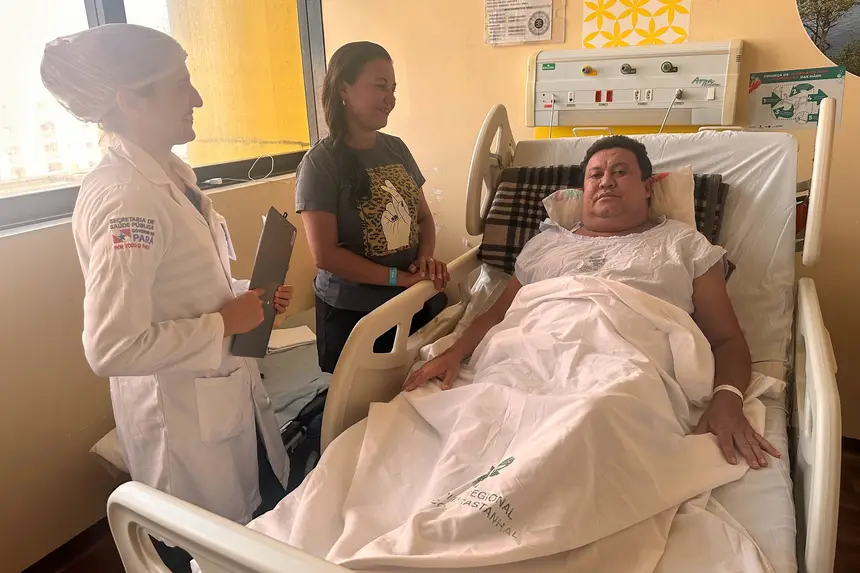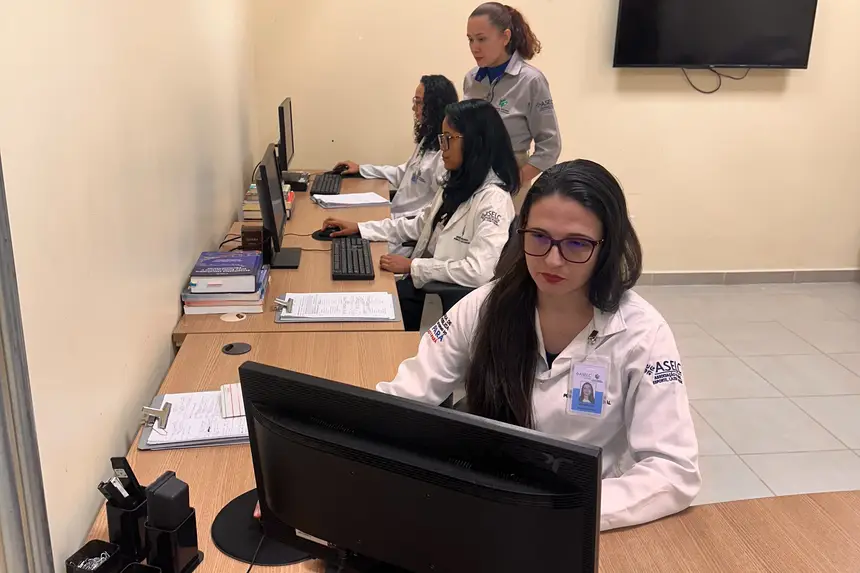Clinical pharmacy ensures safety in medication use at the Regional Hospital of Castanhal
With the support of the NoHarm software, professionals at the health unit of the Government of Pará evaluate prescriptions and avoid possible errors in administering medications to patients
Medication safety is a priority in hospital settings, and clinical pharmacy plays an essential role in the routine of the Regional Public Hospital of Castanhal (HRPC). The pharmacists working in the clinics conduct careful evaluations of medication therapies daily, helping to ensure that medications are used rationally and efficiently. This is one of the main functions of clinical pharmacy, which works directly with the patient to ensure that each prescription is safe and meets the needs of each patient.

The farmer José Odair Oliveira, 53 years old, a resident of Viseu in the northeast of the State, is hypertensive, and upon entering the Hospital for renal treatment, he was worried about the administration of his hypertension medications. "In addition to the kidney problem, I am hypertensive, and I was thinking about how it would be to take these medications. But the professionals did not stop giving me the medications, always at the right time. I have nothing to complain about. They are attentive and care if we are taking the medications correctly," José said.
Technology - At HRPC, professionals have a great ally to provide excellent care: Artificial Intelligence. A software called NoHarm helps improve care for SUS (Unified Health System) patients. The Regional Hospital of Castanhal is the second in Pará to use this technology.
"The AI tool is integrated into our electronic medical record, assisting and streamlining the work of the clinical pharmacist in evaluating the more than 8,000 medical prescriptions generated at the Hospital monthly. This way, we can avoid medication errors and ensure that everything is in accordance with the Hospital's protocols," explained pharmacist Jéssica Barbosa, coordinator of the Pharmacy.
The use of Artificial Intelligence (AI) in hospital pharmacy has shown significant results. Since the implementation of the tool, the acceptance rate of pharmaceutical interventions has increased from 75% to 87%, with 100% of medical prescriptions analyzed. Only in June, more than 1,018 people benefited. The data reflects the effectiveness of the good practices adopted in promoting the safe and rational use of medications.

Heightened Attention - The system performs a preliminary evaluation of the prescription, signaling possible risks in the medication therapy, which will be assessed by clinical pharmacists. "When the doctor makes the prescription, NoHarm performs the initial reading, classifying the patient based on the information in the medical record. The clinical pharmacist accesses the system daily to analyze the scores made by the AI and make the necessary interventions with the medical team, checking if they make sense for the patient and recommending adjustments to the prescription if necessary. This intervention is the moment when the pharmacist contacts the doctor or multidisciplinary team to make recommendations for adjustments in the medication therapy," explained Jéssica Barbosa.
For intensivist doctor Marcos Vinícius Pereira, "clinical pharmacy plays a crucial role in our Hospital. It always brings benefits regarding costs, the autonomy of antibiotic use, and various interventions related to patient care. Together, we can identify alternatives, promote the rational use of antimicrobials, reduce sedation, and perform other procedures that contribute to a faster and safer recovery."
The director of HRPC, Patrícia Hermes, emphasized the importance of AI in strengthening care. "As a hospital manager, I see Artificial Intelligence as a great ally in pharmacy. It allows us more precision in analyzing prescriptions and more safety in dispensing medications. This translates into agility in processes, reduction of errors, and, above all, more quality in the care of our patients. Technology comes to strengthen our commitment to excellence and safety in care," said Patrícia Hermes.
Text: Patrícia Bahia - Ascom/HRPC









